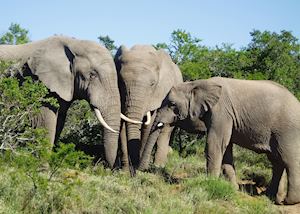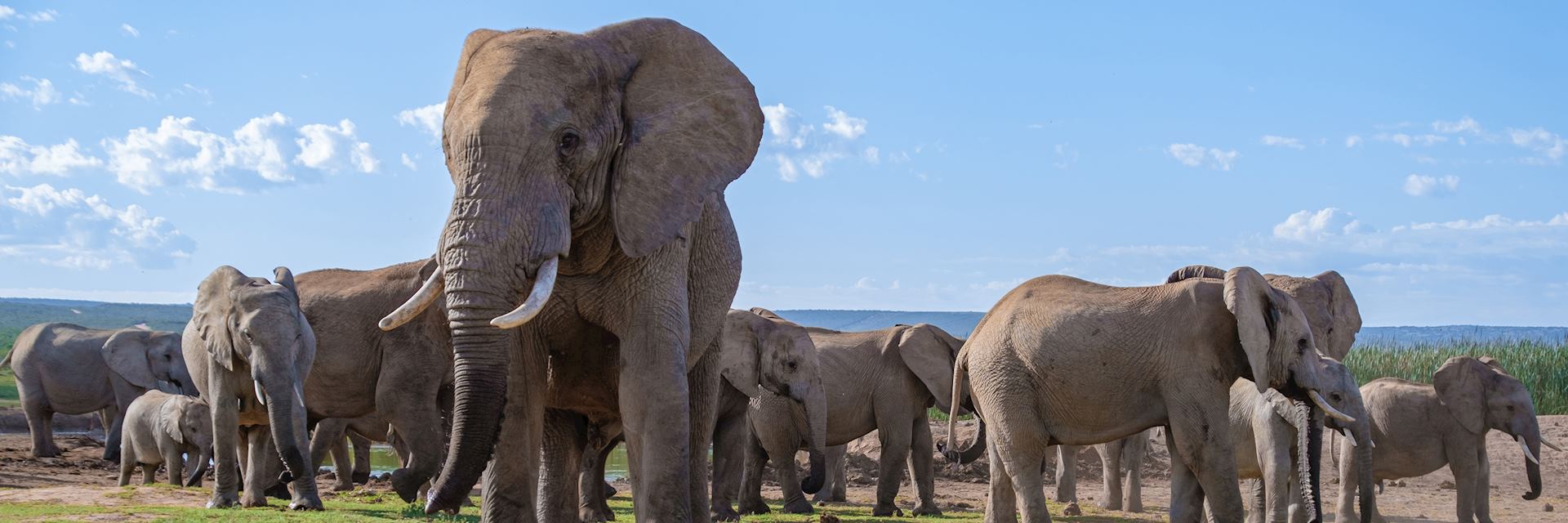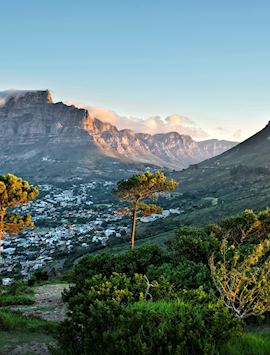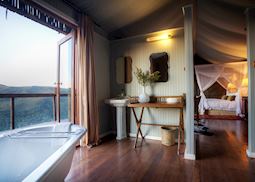Jump to:
A habitat for over 600 elephant as well as lion, buffalo, black rhino, leopard and spotted hyena, Addo Elephant is the third largest national park in South Africa. It stretches from the Karoo area in the north, over the Zuurberg Mountains and south down to the coast. The park is also well-known for its birdlife, with hundreds of species taking advantage of its woodland, grassland and coastal areas.
Tented camps, self-catering bungalows and plush lodges dot the park, allowing you to stay right in the heart of the wilderness. By day, head out on safari in your own vehicle or on a guided game drive to track the Big Five, returning in the evening for sundowners around the campfire.
South Africa specialist RobI love visiting Addo Elephant National Park as it presents almost failsafe opportunities for seeing an incredible variety of wildlife. The largest safari area in the Eastern Cape, it's home to the Big Five and exceptional birdlife, particularly during the summer.
Things to do in Addo Elephant National Park
Self-drive safaris
Hiring a car to explore the park at your own pace is a good option for at least some of your stay. It combines well with guided activities such as game drives from your lodge. You'll have the flexibility of being able to stop as often and for as long as you wish, concentrating on the species you're most interested in.
Wildlife is used to seeing vehicles around the park, so you can often get close-up views of lion lazing in the grass and elephant herds crossing the road in front of you. The best time to see most animals is early in the morning or toward the evening, when they're hunting.
If you still want to benefit from the expert knowledge of a guide, you can hire one from the local community to help point out wildlife you may otherwise miss and explain the reasons behind each animal's behaviour.
Game drives from your accommodation
 Organised game drives with an experienced guide will be offered from your lodge or camp. The drives depart at set times each day in the morning, afternoon and, sometimes, at night. In an open 4x4, you'll cover different areas of the park as your guide points out wildlife, from herds of elephant splashing around in the waterholes to shy reedbuck antelope and elusive leopard skulking in the vegetation.
Organised game drives with an experienced guide will be offered from your lodge or camp. The drives depart at set times each day in the morning, afternoon and, sometimes, at night. In an open 4x4, you'll cover different areas of the park as your guide points out wildlife, from herds of elephant splashing around in the waterholes to shy reedbuck antelope and elusive leopard skulking in the vegetation.
Morning drives often require an early wake-up, but this is your best chance of seeing a wide range of wildlife as the park awakes with the rising sun. In the afternoon, you can head off on a drive that lasts until early evening and usually ends with sundowners at sunset.
Night drives seek out nocturnal animals, such as the park's buffalo. Over time, the buffalo learnt to come out predominantly at night due to the hunting that took place in the region before the park was established.
Spotting the Big Five
Among the range of wildlife living in the park are Africa's Big Five species: lion, elephant, buffalo, black rhino and leopard. You've a good chance of ticking off your Big Five checklist without leaving the park boundary.
Elephant sightings are all but guaranteed, with populations in the park growing from just 11 in 1931 to over 600 today. Lion and spotted hyena were introduced relatively recently but are thriving. Cape buffalo, numbering over 400, are being seen more often during the day despite being predominantly nocturnal. Endangered black rhino are harder to find, as are the secretive leopard, but with the help of a guide you may be lucky.
The park is also host to Cape mountain and Burchell's zebra, several antelope species including eland, kudu and bushbuck, warthogs, hippo wallowing in the Sundays River and the largest population of flightless dung beetles in the world.
Birdwatching
Possessing five of South Africa's nine vegetation biomes, the park attracts an array of bird species that take advantage of the dense spekboom thickets, open grassland, wooded kloofs (ravines) and the vast Darlington Lake. Guided birdwatching trips on foot, by 4x4 or by boat can be organised, or you can focus on birdlife during your daily safaris.
African crowned eagles breed in Zuurberg's wooded kloofs, where you'll also spot olive bush shrikes and yellow-throated woodland warblers flitting through the trees. Alexandria Forest in the Eastern Cape supports forest species such as the chorister robin chat, grey cuckoo shrike and black cuckoo, whose distinctive calls resound during the summer.
Swifts, Sandwich terns and common terns roost in large numbers at the mouth of the Sundays River in the summer. Darlington Lake's Karoo vegetation of succulent plants attracts many endemic species such as the Karoo chat, pririt batis and rufous-eared warbler. Around the lake's dam you may also see lesser flamingos, freshwater terns and Goliath herons — the world's largest heron species.
Best time to visit Addo Elephant National Park
The park's climate is classified as semi-arid to arid, receiving around 450 mm (17.5 in) of annual rainfall, on average. The rainfall is distributed fairly evenly throughout the year, but there are peaks in February and March as well as October and November. Between November and February, temperatures can reach over 40°C (104°F), while winter temperatures between May and September are mild during the day but cold at night.
who's been there

Start planning your tailor-made trip to Addo Elephant National Park by contacting one of our South Africa specialists
-
01993 838 92501993 838 550
- Make an enquiry
Suggested itinerary featuring Addo Elephant National Park
This sample itinerary will give you an idea of what is possible when you travel in Addo Elephant National Park, and showcases routes we know work particularly well. Treat this as inspiration, because your trip will be created uniquely by one of our specialists.
Places near Addo Elephant National Park
- Amakhala Game Reserve 18 miles away
- Shamwari Private Game Reserve 20 miles away
- The Eastern Cape Game Areas 30 miles away
- Port Elizabeth 33 miles away
- Pumba Private Game Reserve 37 miles away
- Kwandwe Private Game Reserve 53 miles away
- Tsitsikamma Forest 114 miles away
- East London 128 miles away
- Plettenberg Bay 144 miles away
- Knysna 161 miles away
- The Klein Karoo 167 miles away
- Wilderness 187 miles away
- The Cango Caves & Swartberg Pass 206 miles away
- Oudtshoorn & Surrounds 206 miles away
- Coffee Bay 223 miles away
- Calitzdorp 236 miles away
- Port St Johns 256 miles away
Photos of Addo Elephant National Park
Accommodation choices for Addo Elephant National Park
We’ve selected a range of accommodation options for when you visit Addo Elephant National Park. Our choices usually come recommended for their character, facilities and service or location. Our specialists always aim to suggest properties that match your preferences.
-
![The Elephant House, The Addo Elephant Park]()
The Elephant House
Addo Elephant National Park -
![Camp Figtree, The Addo Elephant Park]()
Camp Figtree
Addo Elephant National Park








